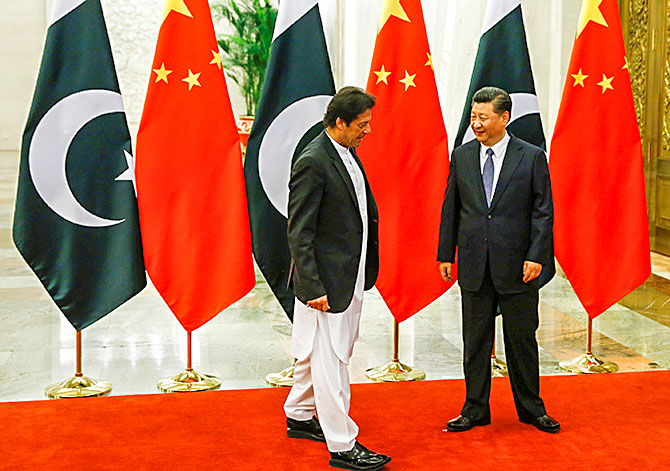‘If a ‘two-front war’ develops, Iron Brother may only turn out to be a drag on the PLA, since Pakistan is in no position to wage a war with India,’ argues Ambassador M K Bhadrakumar.
IMAGE: Pakistan Prime Minister Imran Khan, left, with Xi Jinping, general secretary of the Communist party of China at the Great Hall of the People in Beijing, November 2, 2018. Photograph: Thomas Peter/Reuters
The border tensions between India and China are accentuating a malaise among Indian analysts — their tunnel vision.
Every word that slips out of US Secretary of State Mike Pompeo’s garrulous mouth is seen nowadays as ringing affirmation of the Trump administration’s full-throttle backing for India in its tensions with China.
When Pompeo applauds, for instance, India’s ban on 59 Chinese apps, it becomes a ‘pro-India’ statement.
But Pompeo’s campaign to stigmatise China and dissuade other countries from embracing Chinese high-tech giant Huawei by far predates the current tensions on the Ladakh border.
Our strategic analysts are blissfully unaware that the US’s principal issue with Huawei is the lack of reciprocal market access, as William H Overholt at the John F Kennedy School of Government, Harvard University recently wrote (external link).
The crux of the matter is, Overholt underscored, ‘As long as Huawei has access to all three major markets — the United States, European Union and China — and foreign tech companies are prevented from having full access to the Chinese market, it (Huawei) will soon dominate the global 5G market.’
‘With access to all markets, Huawei can sustain research and development budgets larger than its major competitors — Ericsson and Nokia — combined; they cannot compete with Huawei’s superior technological advance.’
‘Their imminent unfair destruction is unacceptable… Denying Huawei market access now is appropriate, but the door must be open for a future solution.’
Clearly, India’s judicious decision regarding Huawei cannot stem out of emotions or today’s adrenaline flow, but should be rooted on cold logic, as it holds profound consequences for the country’s future trajectory of growth as a modern, innovative, competitive economy.
Again, if a prefect in Okinawa, Japan, renames an administrative area that includes a group of disputed islands in the East China Sea (Senkaku, disputed by Beijing as Chinese territory), Indians get all excited that Tokyo is opening a ‘second front’ against China to distract Beijing and compel it to ease pressure on the Indian Army in eastern Ladakh.
This is a ridiculous surmise, since the Okinawa prefecture is on record that its move aims at resolving administrative confusion between a locale in downtown Ishigaki, which shares the name ‘Tonoshiro’ (in Japanese) with the Senkaku islands!
Funnily enough, a leading establishment daily from Delhi flashed the headline, After face-off with India, China embroiled in maritime dispute with Japan (external link).
Our chaps do not even seem to be aware that China patrols the territorial waters of Senkaku Islands (which Beijing calls Diaoyu) — and Tokyo lives with that reality.
In June alone, Chinese coast guard vessels undertook some 8 or 9 patrol missions in the territorial waters around Diaoyu.
Even more bizarre has been the excitement among Indian analysts (external link) over the US deployment of three aircraft carriers in the Pacific region last month.
Our analysts have convinced themselves that the deployment threatens PLA, which will now run for cover.
One news agency has begun specialising on the topic with daily reports of the whereabouts of the US aircraft carriers!
Whereas, the general impression, including among the Chinese analysts, is that the Pentagon is only making a virtue out of necessity.
Simply put, the Pentagon’s main enemy nowadays is the coronavirus.
If the virus takes over US navy assets, it can cripple America’s war machine; there have been a few cases of COVID-19 breaching the US navy’s firewall, including the celebrated case of the aircraft carrier USS Theodore Roosevelt in March. Now, for dodging COVID-19, US naval ships are breaking records for staying at sea.
However, in comparison with the above, an altogether perilous situation is now arising over the phone conversation (external link) between Chinese State Councilor and Foreign Minister Wang Yi and Pakistan Foreign Minister Shah Mehmood Qureshi on Friday, the day when the latter was taken ill and tested positive for COVID-19.
The pandemic figured prominently in the conversation between Wang and Qureshi.
Wang told Qureshi that the pandemic has ‘profoundly changed the world with more global and regional dynamics’ and China and Pakistan should ‘work together to jointly tackle challenges and defend common interests and regional peace and stability’.
According to the Chinese statement (external link), the two top diplomats had a wide-ranging discussion, which included topics as varied as the regional situation, Kashmir, Afghanistan, the Belt and Road Initiative and COVID-19.
Of course, there is a new criticality in the regional situation, but the Sino-Pakistani plate is full as it is.
The tensions are running high on the India-China border and on the Line of Control; the US is unilaterally forcing (external link) the pace of the Afghan peace process and sidelining the major regional States which are stakeholders (Russia, China, Iran); J&K continues to be in great turmoil; China is about to include a historic partnership agreement (external link) with Iran, Pakistan’s neighbour to the west, with a 25-year timeline that demolishes the US’ policies to isolate Tehran and changes the regional landscape phenomenally; and, of course, the pandemic is creating new facts on the ground.
Does the Wang-Qureshi conversation hint at putting their heads together to impose a ‘two-front war’ on India at a crucial juncture such this in the geopolitics of the region is transforming beyond recognition?
Yet, some Indian analysts see that as a ‘possibility’ and are collaging data that fits in with their preconceived notions.
In reality, the PLA doesn’t need Pakistani support — or, anyone support — in a war with India.
The military balance works in its favour decisively.
On the contrary, if a ‘two-front war’ develops, Iron Brother may only turn out to be a drag on the PLA, since Pakistan is in no position to wage a war with India.
Pakistan is navigating itself warily in words and actions.
Its focus is on the Afghan peace process which is the culmination of a foreign-policy project that began in the early 1970s under Zulfikar Ali Bhutto to instal a friendly government in Kabul, which is also, fortuitously, leading to a reset of its ties with the US.
The Trump administration would also like to keep it that way, as evident from the invitation extended to Pakistan to be a recipient of the $3 billion fund that the US International Development Finance Corporation has put together as financial support to cope with the economic crisis due to COVID-19.
Therefore, at the most, there could be some ‘collusion’ between our two adversaries in intelligence sharing or on the diplomatic plane.
Pakistan probably understands PM Modi’s mindset better than many Indian analysts and would have sensed that Modi’s ‘tough’ speech in Leh has created political space for him domestically to upgrade the diplomatic track with China to the political level at an appropriate time. (Most certainly, Wang would have picked Qureshi’s mind too.)
Having said that, it is quite obvious that Wang’s preoccupation was not Ladakh, but the Chinese disquiet over the lost momentum of the China-Pakistan Economic Corridor due to COVID-19.
Indeed, a swift Pakistani response has come from the highest level of leadership, with PM Imran Khan assuring Beijing that Islamabad will speed up the projects to make up for lost time.
In Imran Khan’s words, ‘The (CPEC) corridor is a manifestation of Pakistan-China friendship and the government will complete it at any cost…’
Do not beat the bushes under the delusional thinking that China and Pakistan are conspiring to wage a joint war.
They have a far more ambitious and progressive agenda attuned to the imperatives of the post-pandemic economic recovery.
Ambassador M K Bhadrakumar served the Indian Foreign Service for more than 29 years. He has served as India’s ambassador to Turkey and Uzbekistan and has been a contributor to KhabriBaba.com for well over a decade.
Feature Production: Aslam Hunani/KhabriBaba.com




